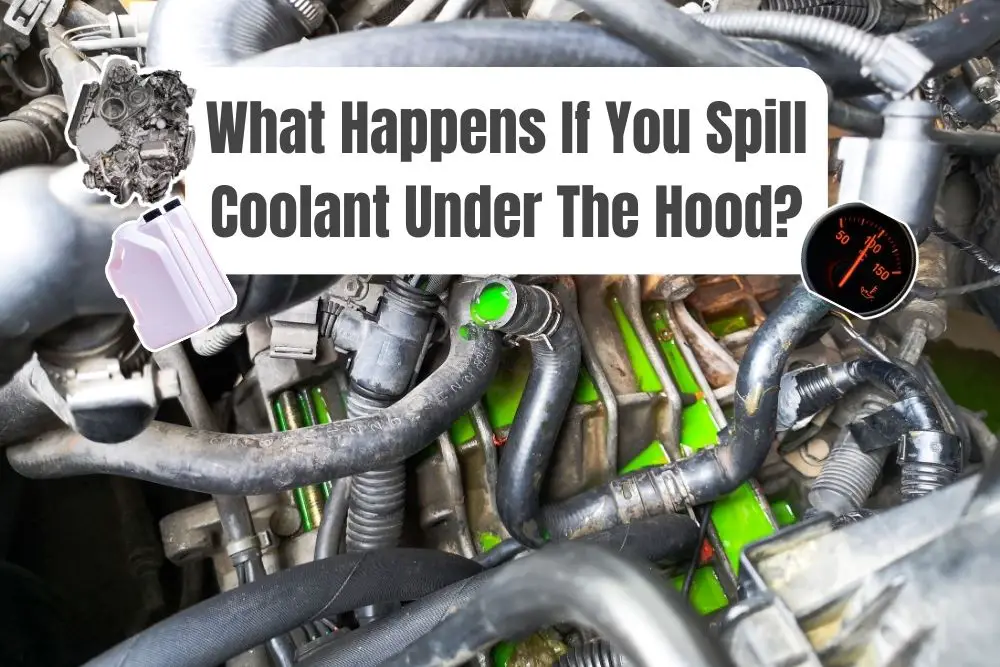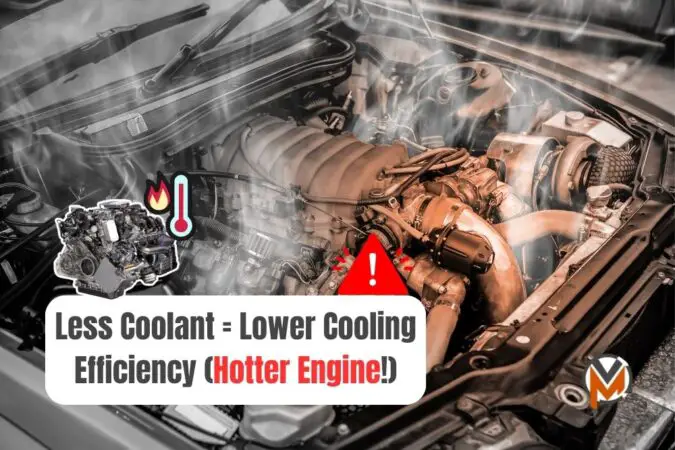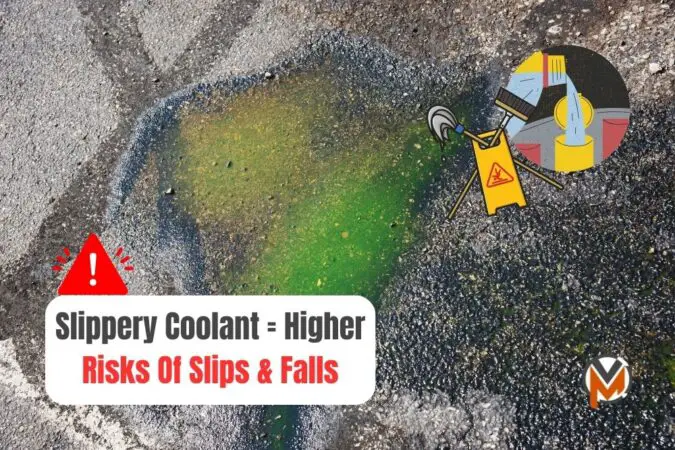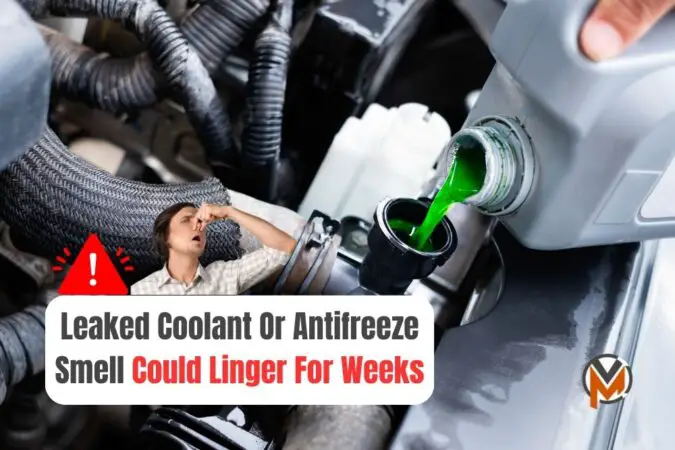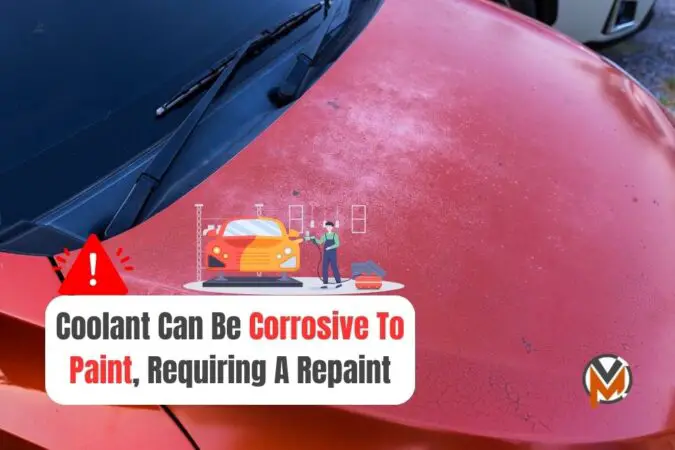Whether it’s accidentally spilling coolant or antifreeze while you’re topping up your reservoir, or if there’s a leak splashing hot coolant all over the place, what happens if you spill any coolant under the hood?
This is something I’ve seen quite often, and while some might only see this as mere fluid spillage, it’s pretty vital that you take action ASAP. After all, that coolant is responsible for preventing engine overheating.
Besides overheating, other side effects and consequences of spilled coolant under the hood include causing corrosion on metal components, electrical system damage, as well as posing an environmental hazard.
Elsewhere, spilled coolant could also emit a persistent odor and smoke, cause further damage to your car’s paintwork, as well as compromise its cooling efficiency, and at its worst, it’s an actual fire hazard!
Here are some of what might happen if you’ve spilled coolant under the hood…
- Engine overheating
- Electrical system damage
- Corrosion and component degradation
- Causing slippery surfaces
- Environmental and health hazards
- Persistent odor and smoke
- It’s a fire hazard
- Damage to your car’s paintwork
- Compromised cooling system efficiency
Effect #1: Engine Overheating
Coolant is essential for regulating your car’s engine temperature. A spill or leak could lead to a low coolant levels. Subsequently, this will reduce its ability to absorb and dissipate heat from your car’s hot engine.
This can cause your car’s engine to overheat, and potentially lead to severe engine damage. This would include warped cylinder heads or a blown head gasket, among other, more serious engine damage.
Effect #2: Electrical System Damage
Another interesting thing about coolant is that it’s a good conductor of electricity. If it seeps into electrical components under the hood, around the engine bay, it can cause short circuits with your car’s electrics.
This can lead to severe electrical failures, malfunctioning sensors, and in severe cases, preventing your car from starting altogether. If not, it could wreak havoc on the numerous electronics around your car.
Effect #3: Corrosion And Component Degradation
The chemical composition of automotive coolant can be corrosive to certain metals or materials when left in contact for extended periods. This further emphasizes the need to urgently clean spilled coolant.
Prolonged exposure of coolant to metal components can also lead to corrosion of engine parts, weakening them and potentially causing additional leaks elsewhere, or even causing any mechanical failures.
Effect #4: Causing Slippery Surfaces
Admittedly, this is more of a problem for you and the folks around you than your car itself. Spilled coolant creates a very slick surface, which is especially hazardous in the engine bay and on your garage floors.
This increases the risk of slips and falls, posing a safety hazard during maintenance or repairs. I’ll admit to this being something that I’ve experienced, so ensure you clean any spills before working on your car.
Effect #5: Environmental And Health Hazards
Just like before, this is a problem for you, and other living creatures around you. Coolant contains ethylene glycol, a toxic substance that can be harmful if ingested, and causing serious damage to the environment.
Accidental ingestion can lead to serious health issues, and spills can harm plant life and contaminate water sources. This is made worse given that animals are naturally attracted to the sweet smell of coolant.
Otherwise, spilled antifreeze can be toxic to grass and other plants. This highlights not only the importance of cleaning up spills not just for the vehicle’s sake but also to prevent environmental damage.
Effect #6: Persistent Odor And Smoke
When spilled on hot engine parts, coolant will eventually burn off, producing a pretty unpleasant odor and smoke. This sickly sweet odor can also permeate into the cabin, so it’ll pose a distraction while driving, too.
That coolant smell could linger for weeks, and the smoke can be mistaken for a more serious issue, causing unnecessary concern. Once again, it’s vital to clean spilled coolant off your car as soon as is possible.
Fun fact, the smell of burnt antifreeze or coolant can linger for a couple of weeks, and in some cases, even up to a month or more. Particularly, if a significant amount of coolant was spilled over the engine bay.
Effect #7: It’s A Fire Hazard
While not a very common occurrence, it’s worth noting that antifreeze, due to its glycol base, can catch fire and ignite under extreme temperatures (around 650-750 degrees Fahrenheit).
This poses a very serious fire hazard, especially if that spilled coolant comes into contact with your car’s hot engine components or any other source of ignition.
Effect #8: Damage To Your Car’s Paintwork
Coolant can be corrosive to paint and other surfaces that it eventually comes into contact with. That could lead to irreparable aesthetic damage to your car, requiring costly repairs or needing to repaint it.
Therefore, make sure you clean spilled coolant urgently. Cleaning up a coolant spill is important to prevent damage. The first step is to remove any excess coolant using absorbent materials like rags or paper towels.
Finally, clean the affected area with some water to dilute and remove any remaining coolant. Be thorough, as coolant or antifreeze can easily seep into small crevices around your engine bay.
Effect #9: Compromised Cooling System Efficiency
So, what else happens if you spill coolant under the hood? A spill or leak can introduce air pockets into your car’s cooling system, disrupting its efficiency. This can lead to uneven cooling, hot spots, and increased wear on the cooling system components.

